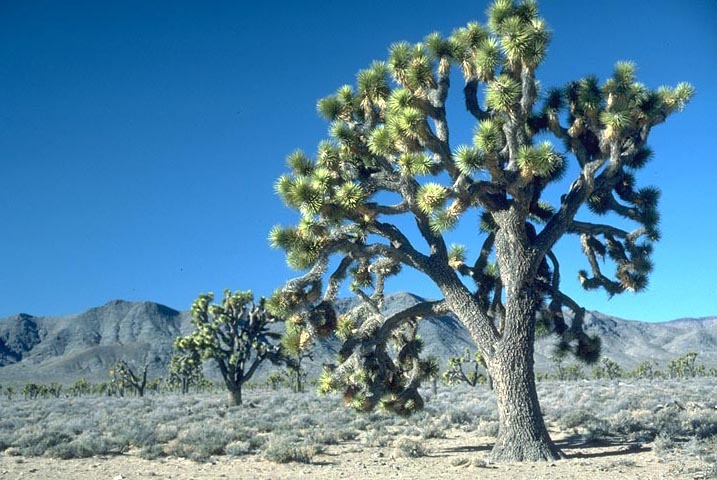 |
Destination Pearblossom"Dawn came up like thunder over California's central valley, but no one felt any distress. The terrain looked like a make-believe desert of large brown dunes, in real life they were only hills, brown with California's dead annual grass." Publishers Note: We were delighted to hear from Olivia de Haulleville again in June 2005, after being out of contact with her for over 15 years. She wrote to us regarding the story, offering many new pieces of information which we were unaware of when the story was written in 1989. We therefore offer the story again with Olivia's annotations. Thank you Olivia. The staff here at the California outpost of Undiscovered Worlds have been on the trail of a mystery for quite awhile now. This mystery just sort of happened we didn't go looking for it, it found us. The first clues came to light at the very beginning of the publishing enterprise. It started in a most innocent way when Hubert Collis sent the enterprise a children's audio cassette to market called "Crows and Kites." The first story on this was entitled The Crows of Pearblossom. It had been written by deceased Subud brother, Aldous Huxley. If you find this title a bit out of the ordinary for brother Aldous, you are not alone.
By one of those strange coincidences, however, Stephanie had just happened to see this little tale years back when it was still in print. Aldous wrote The Crows of Pearblossom for his niece, Olivia. On the cassette, a refined (but enthusiastic) English
accent narrates The Crows of Pearblossom and the
feeling that Aldous himself is speaking jumps right
out at you. Olivia, Aldous's niece who was living in
Indonesia, heard that a children's cassette was being
made and proposed the story herself. When the cassette
arrived here in the states, a sheaf of letters was
attached to the contract, of which the most
interesting were Olivia's. The Undiscovered Worlds
staff were to examine these communications many times,
they contained quite a saga.
Olivia explained that this little story had been a
legacy to her from her uncle, but one of the larger
U.S. publishing houses seemed to perhaps be of the
opinion that they owned the copyright. They had
surrendered their interest to an English publishing
house, who apparently granted use of the story, but
the issue was a bit cloudy. For one thing, anything in
writing granting permission for use of the story by
either publisher was missing from the sheaf of papers.
UWP immediately began an investigation. Crows was out
of print in the U.S. but, was all the same in print by
someone's American rep, a smallish enigma, which ended
in the fact that no print could be located, even
though there was supposed to be one somewhere? The
next line of research was a bit tangential to the
issue, but yes, there really is a Pearblossom,
California. Small glimpses of Olivia's life kept
peeping out of the more tedious business aspects of
the communication. The Huxley's are an adventurous
clan, and apparently, Olivia was no exception.
Soon, UWP could resist no longer and wrote to Olivia directly. In reply, she remarked that she was very happy to correspond with us, but her correspondents "had a way of disappearing." She was herself the author of a small book and she began to explain its strange fate. She had managed to see her book printed, but what could she do from half-way round the world when largish numbers of copies began to disappear? For one example, a man (whom she named, but whom UWP will discreetly not) acquired 2000 copies and then just dropped out of sight. People disappear every day for many reasons, so UWP was not inclined to take this disappearance too seriously (at first). The book itself was mildly enigmatic, UWP learned that among other things, it contains a mirror and a pencil, definitely not an ordinary book. Olivia explained that while the man who had disappeared with the 2000 books might never be located, another 2000 copies were hidden somewhere in the Mojave desert.
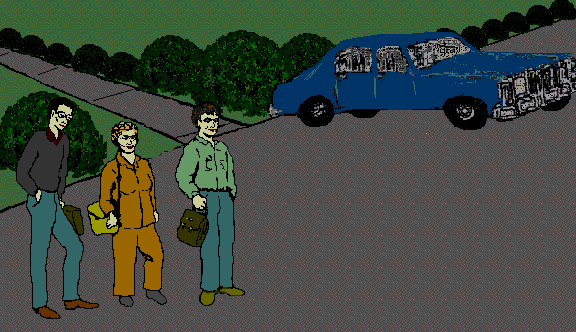
It was the last concept that was to linger on the mind
of one of the staff, Rachman, who, as it happens,
loves deserts. In his younger years, he never had the
chance to experience very much desert, so he collects
postcards with pictures of sand dunes and small
scrubby plants or giant cacti. He has had all the
rain, mist, cloudy skies, grass and other greenery he
could stomach and today, being very quick to chill in
even mildly cool temperatures, he dotes on the very
thought of a desert.
UWP suggested to Olivia that we might be able to
handle her book for her, and she responded
affirmatively, leaving us the problem of how to locate
the books. By writing to various people herself,
Olivia managed to prompt a letter from a man who said
he did have copies of Olivia's book and if we were
interested, to just let him know. UWP wrote back with
alacrity asked for the sample copy that Olivia had
promised, declaring a very definite interest, but we
never heard from him again.
Before we could ask her, Olivia wrote she would have to leave Indonesia. She would try to visit her son who is a monk in an ashram in Nepal, but she confessed, she was unsure where she might wind up. She was sturdily cheerful, but she was having problems. It all had to do with a book she was writing about Indonesian mysticisms. As for her first book, Autobiography of a Fairy, it began to look like the Mojave might be the only answer. Olivia wrote again to say that her visa had been
revoked and she feared she would never be able to
enter Indonesia again, where she had lived for 30
years, and where was she to go? Certain Indonesian
authorities were determined she should not complete
her book, she said. Her letter was written on the eve
of another forced departure. UWP wrote in haste to the
address in Nepal, but heard nothing for some time.
Finally a postcard drifted in saying she was about to
have an interview with the Dalai Lama at the ashram
and there was a big celebration going on. She seemed
happy, and had received our message. She wrote again
in great haste, on the eve of another departure, just
a copy of a letter to her brother in which she asked
if she might take refuge with him, should the worst
come to the worst. In an aside to us, she asked if we
would be interested in publishing her new book which
she was still determined to complete. We wrote back,
saying by all means, but we have had no further word
and are not sure just where Olivia is. Hopefully, she
has wound up in a safe haven somewhere.
When the location of the Subud national congress was
disclosed as Riverside, thoughts of the nearby Mojave
and Olivia's hidden books drifted across our minds.
There had been a long silence from Olivia, but she is
not the kind of person one forgets in a hurry.
Riverside was not far from the small town of
Pearblossom. We traced it on the map and decided to at
least stop off in Pearblossom.
The day before our departure, although we did not recognize it at the time, an unfortunate development took place. On a quick dash to Berkeley, the air conditioning in the car inexplicably started emitting clouds of black smoke,
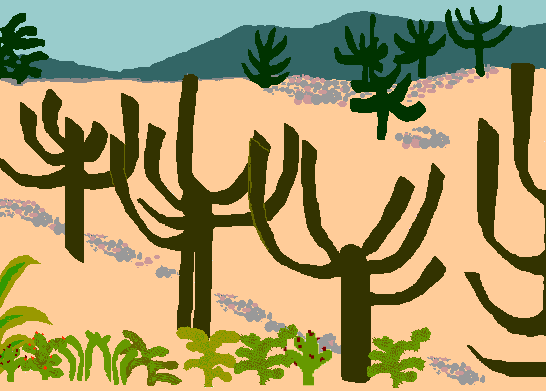
terrorizing the occupants, who managed to pull over and shut it off, certain that the car itself was lost. The air conditioning now had a pungent charcoal smell and didn't work to cool the car, but no cause could be found for those clouds of genie-like smoke. (If any of you have had a similar experience that would explain this in ordinary mechanical terms, we would be anxious to hear?) There was no time to even consider doing anything about this before the trip, but the car seemed to be fine in all other ways. On the night of departure, Rachman and Hartley put the books in the trunk, and wedged our items of personal gear into any crevices left and soon also filled half of the backseat. When they were done, it was discovered that the back of the car now sagged down in a strange way. Do not imagine that books and magazines are light. Paper, though normally considered a light weight material, is quite like lead when packed tightly. It was 2 a.m., and we knew a slightly later arrival time was in the cards, but we didn't mind. So it was that the intrepid explorer club trio set off for Riverside, but in everyone's secret heart, Pearblossom bloomed brightly. Highway 5, the fastest road to Los Angeles and Riverside, was fairly empty of traffic, a good chance for putting as many miles as possible behind us. The first gray light of approaching day found everyone in good spirits. Dawn came up like thunder over California's central valley, but no one felt any distress. The terrain looked like a make-believe desert of large brown dunes, in real life, they were only hills, brown with California's dead annual grass. It was about time to pull into one of the T & A's and fill the tank. There was nothing that remotely resembled shaded parking in these concrete oasises, but no matter, a cool breeze was blowing and it looked like smooth sailing. The crew was too cheerful to want to stop for breakfast, but the relief driver took over the wheel. The sun appeared as a brief bright green flare on a
dune-hilltop, jumped above the horizon and started to
torture the left eye of the relief driver, who
stubbornly maintained that "it shut out too much to
put the visor over on the side window." After hours of
a normal colored sun, the visor finally was put on the
car's side window and sun glasses which wrapped
completely around the face seemed less urgent.
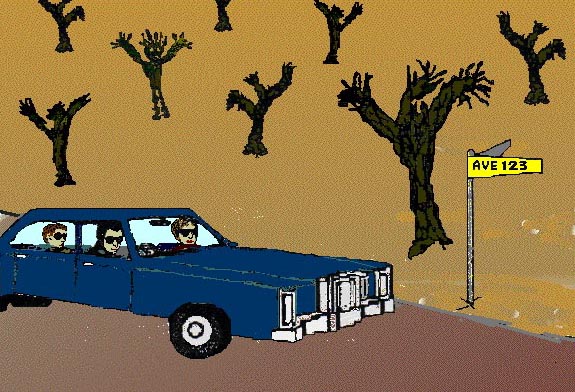 The relief driver, however, was withering fast, so we pulled off for breakfast at a T&A with flowering bushes, a large curio and gift shop, and banks of video gaming machines. The Old West-style restaurant offered Rancher's Omelettes, Trail Blazers Breakfasts, Chuck Wagon Delights, and Pack Saddle Breakfasts. The UWP crew settled for Pack Saddles. Another change of drivers brought us to signs indicating that the Grapevine was imminent. The confusion created by all the warning signs about north and south caused the first wrong turn to be taken, but a handy turn around was found and we were back on a south bound road at about 45 miles an hour. It became obvious that 45 miles was the absolute upper limit of our Ford Granada, to the vast annoyance of more powerful cars. As the altitude came closer to 4,200 feet above sea level, one began to pray for that final summit to be reached. (For those unacquainted with California byways, the "Grapevine" is the name of the stretch crossing the San Gabriel mountains which border Los Angeles on the land ward side. The grapevine climbs a bit abruptly before it plunges down toward Los Angeles.) The map had been checked carefully and it was only a matter of turning onto Highway 38 to reach Riverside via Pearblossom. Highway 38 converted to an unassuming two lane stretch across a very welcome flatlands. Could Pearblossom be very far? No signs graced Highway 38 telling us of the nearness of this or that, Highway 38 simply went on and on (and on). The temperature was now decidedly hot, dusty, and the highway strangely empty. We were very many-miles alone, but began to be accompanied from the roadside by tall cactus-like trees with a strange humanoid appearance. These eerie plants stalked the desolate flat terrain as far as the eye could see, reminding one of that old science fiction film, Day of the Triffids–particularly the part where the characters wake up and find the alien bloodthirsty Triffids growing all around the house. Mountains rose on the horizon beyond–would they have to be crossed in order to reach Palmdale, or one of those other pleasant little towns on the map?
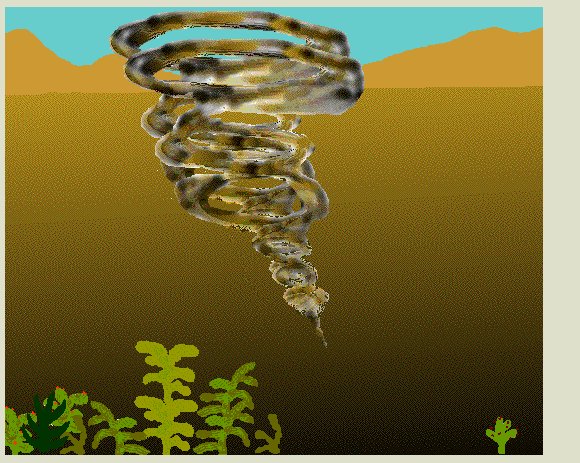
Someone had written something about these bizarre "Triffids," who semaphored to each other across the barren sands. They were sometimes mistaken for human figures? Probably only by unfortunate souls, who had ventured into this desolation and lost their way. One of the Triffids, was bending over a large book reading to its fellows, a mile away, another conducted a silent plant symphony. A miniature cyclone of sand, only about five feet in diameter whirled high up into the skyóthe name of that came readily to mindódust devil. And finally, Joshua Trees! Of course, the Triffids were called Joshua Trees. Their incredible profusion dazed the mind, a plant army stretching across these barrens as far as the eye could see. It was very, very hot now, with no road signs to even
identify the highway. At breakfast, we had decided not
to stop until we reached Pearblossom, but the driver
made a silent private vow to stop at the first sign of
shade and give the car a really good cooling off very
odd there were no other cars on this road. Finally,
another vehicle began to play long distance tag with
us. The driver debated pulling over in the blazing
heat, but it did not seem too good an idea, we'd lose
even the hot wind from the partly open car windows.
Rachman, the English member of the crew, began to
wonder out loud where we'd get the date milkshakes
he'd been told about. (Better not to mention just now
that this had been in Twenty Nine Palms, a different
kettle of fish altogether.)
The driver laid back a bit to let the other vehicle catch up–a jeep with a strange insignia on its side and prominent CB aerials. It passed quickly and we were alone again among the Joshua Trees. New phenomena–concrete pillars about a foot in
diameter and six to ten feet tall appeared along the
roadside and could sometimes be seen far off in the
middle of the Joshua trees. Odd looking towers, they
were obviously man made, but unattached to anything,
and serving no visible purpose. Perhaps we had strayed
through a space warp and were in an alternate universe
or on another planet.
A brief dusty sign informed us that we were in a
"desert conservation area." Obviously, they were
having no trouble with the conservation effort. Owners
of the Sahara, Gobi, the Dead Sea, etc., may just have
a shock in store. Southern California may be about to
call for a competition for the title of "most desolate
place in the world"that Joshua Tree ridden plain
would win the contest hands down.
A surrealistic jolt to the already embroiled state of
mind a city street sign on this desolate
roadside something was supposed to be Ave. 123. But
there were no buildings of any kind on Avenue 123, and
skipping over a small scrape of some kind in the sand,
there was also no avenue. Well, of course, the map had
called this the Antelope Valley, but obviously, and
for good reason, there were no antelope either.
Usually such terrains have straight forward
descriptive names: The Devil's Anvil, for example,
Blast Furnace Flats, Joshua Tree Barrens, Desolation
Valley, (the name Death Valley is already taken by
another spot in the Mojave).
Civilization was finally reached a small but real city bleaching in the sun loomed up. "Loomed up" is an exact description, sprawling car lots, and rug merchants appeared high on the horizon much too close to the freeway. The whole place seemed to hang in midair. No citizens moved on those shadeless streets. Very likely, the shadeless residences contained air conditioning systems that were state of the art and no one, who did not have to, would come out into this inferno. A few cars from this metropolis–where man was never intended to live–sluggishly joined us on a Highway 38 that now transformed into a wide and multiple lane freeway. The first road signs appeared, indicating the danger of turning toward the LA freeway system instead of Highway 38 which the map still promised would take us straight into Pearblossom. In the confusion of avoiding the danger spots, the name of the floating metropolis was confused and lost. We were now on a multiple lane freeway looping through some very hot mountains. On their slopes, abandoned human dwellings and now small modern ghost towns, could be seen. Pearblossom had surely gone by without so much as a small green sign to signal that you had passed it. Very likely Pearblossom had been one of those small ghost towns and no longer existed as it had in Aldous's day. The driver was prepared to press on, Los Angeles was
still amazingly far away. A sign saying, Pearblossom
Highway, 1 mile, swept by. A mile is very short by
freeway, and no ramp leading to Pearblossom Highway
was seen and a mile had obviously gone by. The driver
pointed out that a "Pearblossom Highway" and
"Pearblossom itself" could be two different things
altogether, totally unrelated to each other.
Rachman began to fidget seriously. He realized, he
said, that he was not going to have a date milkshake
and he'd really wanted one. Also, he pointed out, this
might be the only time we passed this way, and how
would we feel if we didn't make a real effort to
locate Pearblossom? He was informed that date
milkshakes were available in Twenty Nine Palms which
did not even vaguely resemble what we had been
through. But this only caused him to remember that he
also wanted to see Palm Springs and he knew, he said,
he wouldn't, not on an awful trip like this. His
protests became more vociferous with every passing
mile.
There was nothing for it, finally, but to turn off this looping freeway that was carrying us along on its swift current toward Riverside. We turned into a fair sized scattering of buildings on the mountainside. A woman who lived there, insisted that there really was a Pearblossom. She said the freeway was marked wrong, and everyone made that mistake. She also said we had somehow left Highway 38, perhaps back at the hanging city, and our only recourse was to head back north along the same freeway, where, she assured us, it was all clearly marked. We were grateful to that small nameless town, even though when we tried to get into the only shade by the gas pump, a cowboy in a pickup truck swung quickly in front of us. Probably it was what is called a "cow town." Other cowboy types were at the gas station hosing off their pickup truck radiators and themselves with the only water hose. There was more desert before we reached Littlerock.
The driver was for pressing on to Pearblossom, but a
cry from the UK member, indicated that there had been
a sign saying date milkshakes were for sale on the
other side of the highway. It took some maneuvering to
get back, but we arrived at a place called Charlie
Brown's. Apparently all of Littlerock had also closed
in on Charlie Brown's. The reason for the attraction
was soon apparent. Charlie offered espresso,
cappuccino, whole wheat croissants, apparently an
organically oriented sort of fellow, and there was
every flavor of milkshake the mind could devise. When
the end of the queue meandered past Charlie's dried
fruits and fancy dates was finally reached, date
milkshakes were duly ordered. Touched as we were by
this citadel of civilization in the wilderness, we did
not linger long, all the seats, never mind the shaded
ones had already been taken.
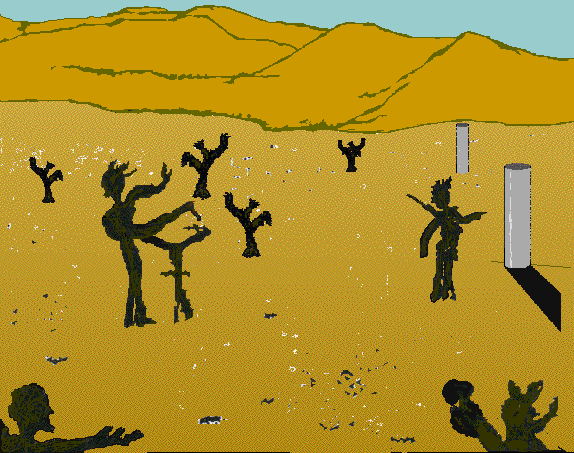 It was a several million more Joshua Trees before we
finally entered Pearblossom. Alert that Pearblossom
might not extend very far, we quickly swung over to
avoid leaving prematurely. The UK member expressed
distress as a sign saying, "Pearblossom Park," had
been passed before we could get over. He wanted to
turn back to Pearblossom Park at once. But the rest of
the crew were for driving very slowly up the street we
were on. An incredible sight lay ahead, a real tree
shaded this small tree at the corner. Ever so slowly,
hoping not to disturb anyone, the car approached and
eased into the shade. Everything was quiet along this
street, and one marvelous feature of the town stood
out. Pearblossom residents favored shade, they
industriously encouraged bushes, trees, all kinds of
shade bearing ornamental's. We were charmed to see a
bird bath in the same yard from which the copious
shade tree grew. Local birds were equally charmed and
bathed happily in this good Samaritan's generous
desert hospitality which sheltered under the same
tree. We were a little nervous that the house owner
might come storming out demanding to know what we were
doing in his shade, but no one seemed to take notice.
The bird bath suggested we might have come straight to
the house that the Huxley's had once occupied. But
there was nothing to mark this, if it was so. Rachman
declared that the park was where we'd see memorials
and plaques dedicated to Aldous Huxley.
It might be possible to drive back to the Pearblossom
Park road along the street in front of us, but, the
driver announced firmly, that there was no way that
the car was going down that small desert road among
the Joshua Trees. The park road was reached and
gingerly, the car turned down it, with another firm
reminder from the driver that we were not going down
this road for any distance. There was no need, as it
turned out, Pearblossom Park was quickly spotted. It
was only a small children's park with swings and a
slide. We agreed to park briefly on the roadside so
Rachman could "get up close to one of the Joshua
Trees." The recollection that the Huxley story had
mentioned rattlesnakes, however, kept him from
exploring too extensively. From this road, Pearblossom
could be seen green and shady in the ghastly heat in
the middle of a Joshua Tree wasteland. Rachman
returned to the car dissatisfied, but a rattlesnake
was a rattlesnake. We moved on slowly.
At the bottom of this road, a large black bird flew in front of the car, bringing us to an abrupt stop. Another sprang up from bushes surrounding a corner house. Distantly, but definitely, a caw could be heard. From a Joshua Tree, the big fellow who had flown across the road surveyed us curiously, his black beak and blue black feathers afire in the sun. He was a most dignified creature, perhaps it would have been more proper to call him a raven, rather than a crow. But by any name, there could be no doubt that he or one of his ancestors had inspired Aldous to write his story. Even in our heat besotted conditions, it was quite a moment to see those big black birds on the wing in the desiccated air of Pearblossom. Well, if the crows stilled lived in Pearblossom, some
of the residents should recall Aldous, or his niece
whose family name is de Haulleville. We stopped at the
local store to make inquiriesóusually, small towns are
very conscious of their famous. But no one in
Pearblossom knew that Aldous Huxley had ever been
among them. Those we questioned seemed startled by the
very suggestion of the Huxley family. We could not
even get to the subject of Olivia's books, an
atmosphere of resentment bordering on hostility or
suspicion quickly developed. We lingered outside the
store, but obviously, we could not start knocking on
the doors of private houses after the reaction in the
store. We had come to a dead end in one way, in
another, we had not. We had actually seen the crows of
Pearblossom.
Well, this was only our first foray into the mystery. At least you can see that we are not just desk bound publishers here at the California post. We often hear the call of the open highway. For the foreseeable future, we will be in one place hunched like medieval monks over our computers until the books and the next issue of the magazine are ready. When they are, we will shake off the dust, break camp and our little caravan will set forth. I wonder where that ribbon of highway will take us? To the mystic allure of the Southwest, Arizona, land of the Sunbird, New Mexico, the land of enchantment, the four corners tablelands where the Hopi and Navajo still live a part of their traditional life? To Mt. Shasta, where people say they are receiving messages from the lost city of Shambhala? Perhaps even down the clove scented back roads of ancient Java? Wherever we go, be sure that we will spread our carpet on the ground to display the brightly colored wares designed and sculpted by you. Like those clever Semitic traders of yore, we will bargain and get the best price we can. And when all is done, we will return, bringing new wares in trade, to share our profits and stories with you.
Olivia: How bout coming to visit MEE on Yucca Mesa in Valley Valley 10 miles from the Integraton gathering place of the UFO enthusiasts who held annual "Spacecraft Conventions" at Giant Rock 25 years ago.
|

Copyright© 2007, Undiscovered Worlds Press
|
|
